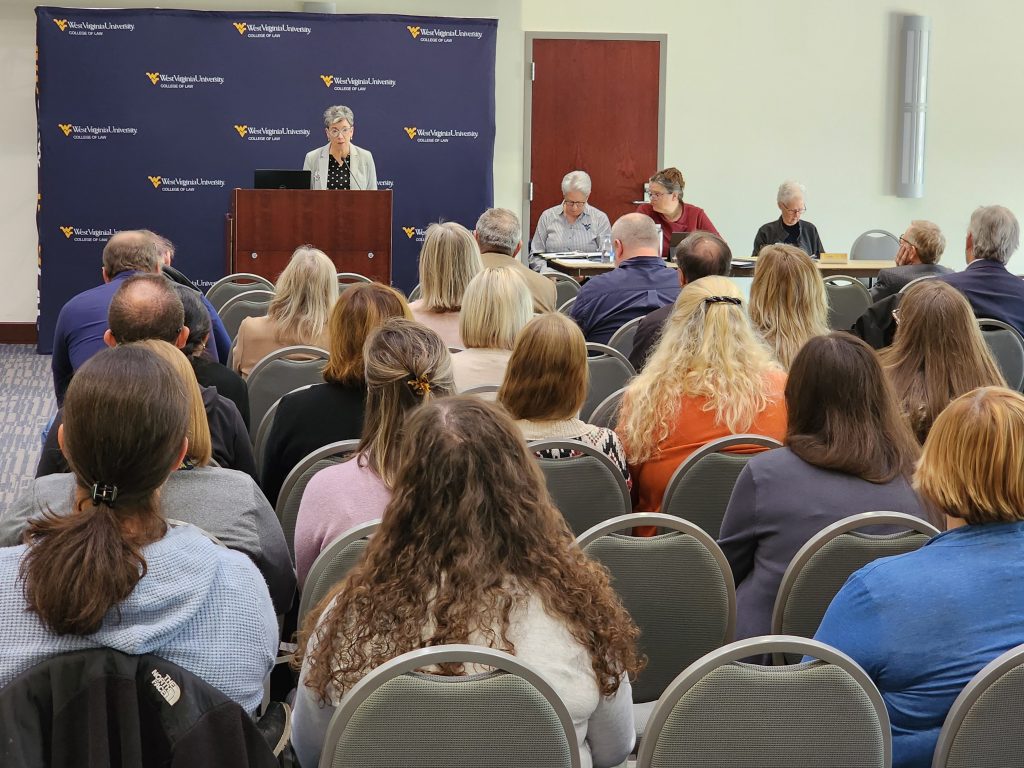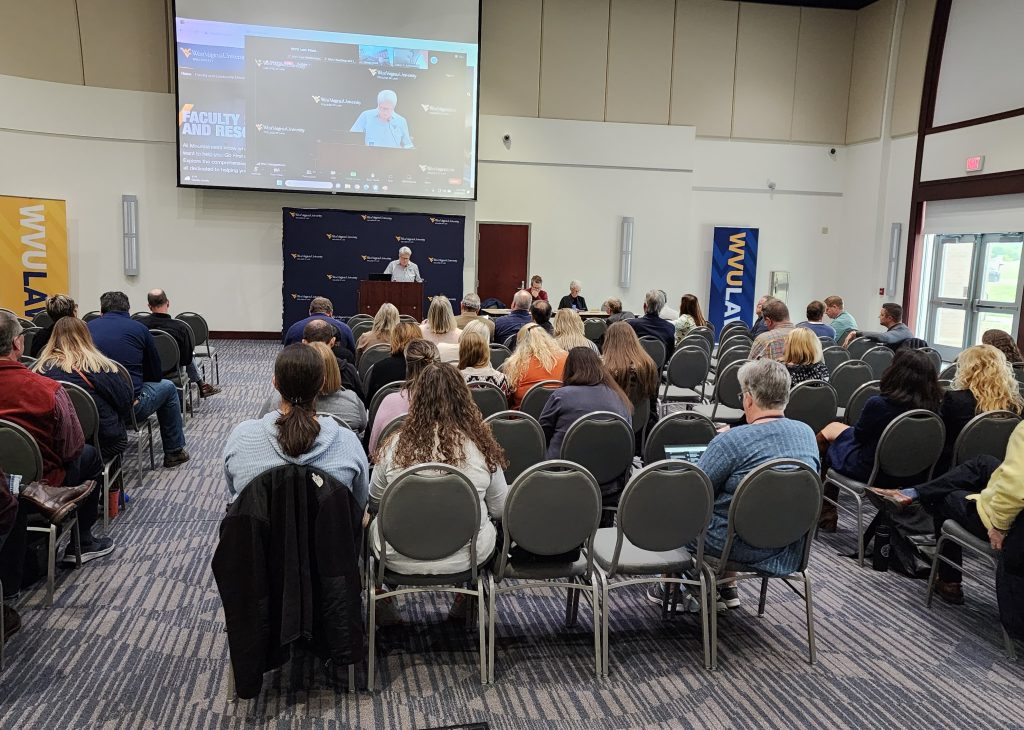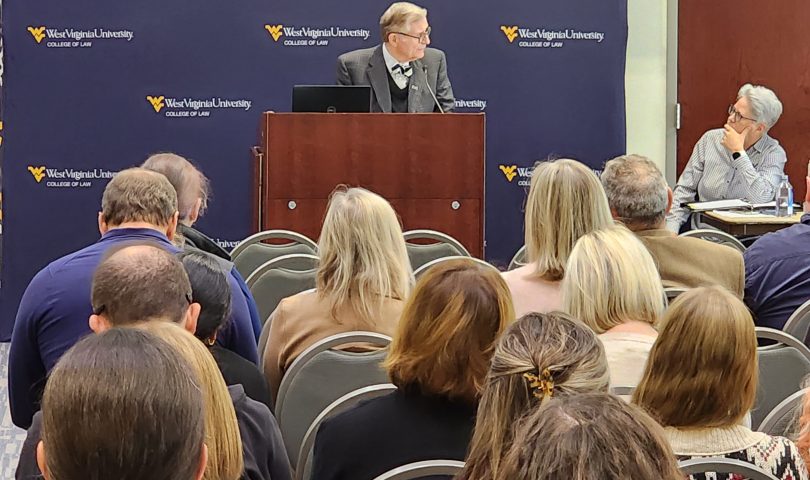MORGANTOWN – Reduction in force notices have started going out at WVU, and the RIF process was at the front of most minds at Monday’s Faculty Senate meeting.
Chair Frankie Tack choked up during her discussion of the topic, saying a friend and neighbor of hers had just received notice.
“This is such a difficult time for those professors and their families,” she said. “We also want to acknowledge the colleagues and the students that are grieving with you and who will miss you for a long time to come. We hope for all of you that you can find moments of solace amidst the storm.”

Provost Maryanne Reed told the senators there was one bit of good news: The number of faculty to be subject to RIF has declined by more than 50%, from 143 to 69.
“There were a significant number of faculty that voluntarily retired or resigned from the university,” she said. “I realize that is of little solace for those faculty members that will be losing their positions.”
Her team is now working on the program review process timeline for WVU Extension and the regional campuses in Beckley and Keyser. The process will be slightly different, she said, for the two campuses because they are smaller and have their own missions and expectations. They plan to lay out the process no later than the Nov. 17 Board of Governors meeting.
President Gordon Gee also addressed the Senate, standing before the representatives of the faculty that on Sept. 6 approved a no-confidence resolution against him in a 797-100 vote.
“These next few weeks will be challenging for many as we move through this reduction in force process,” he said. It will be difficult for those affected and those who remain.
But he also spoke of what’s ahead, noting that in late September, the Association of Public and Land-grant Universities designated WVU as an Innovation and Economic Prosperity University, one of just 80 universities to receive that designation.

“Though we are facing challenging times, these important designations remind us that we are committed to our land grant mission,” he said.
He also had positive news regarding recruitment and retention. Retention of the fall 2023 cohort was 81.8%, up 2.9% and the highest ever except during COVID when they had more lenient policies. And the four-year graduation rate – the rate of those who graduate within four years of starting – is also up; it was 39% in 2014 when he began his second stint as president and is now 50%. For new students, applications are up 7% and admissions are up 7%.
The bulk up the meeting was taken up with a Q&A session for Gee and the leadership team.
General Counsel Stephanie Taylor took a question on how they assure that RIF plans are constructed consistently from college to college. She reminded the senators of the three RIF criteria: performance,
knowledge and skills, and seniority.
Each college works with her office to put together its plans, she said, and her team vets the knowledge and qualifications portions to make sure they are objective and verifiable. The plans are also reviewed by the RIF Committee, and the committee sends back questions if needed. “We do review those very, very closely.”
Gee took a question on how they plan to prevent this being repeated going forward. He said that through this process they want to put themselves into a position to be competitive and grow and invest. “By doing this now we will have put ourselves in a way that we’re not out over our skis.”
Also, he said, the state funding formula will kick in this year, which will be immensely helpful. “I’m very bullish about our opportunities for the future.”
A follow-up question dealt with the $45 million budget deficit. He clarified that the deficit was $35 millon, with $10 million added by what they owed the state for PEIA.
Overall, the $45 million is just 2.5% of WVU’s budget. As such, he said, the deficit was only an accelerant of change. “The reason we’ve been going through this process is the world is changing around us rather dramatically.” But there are never any guarantees of avoiding future problems.
To further address the budget issue, Rob Alsop, vice president for Strategic Initiatives, told the senators that WVU’s new budget model will help in terms of clarity, engagement and transparency. They will look for leading indicators and enhance their reporting on revenues and expenses going forward. More data will be provided more often, and there will be more regular program and administrative reviews to address issues in a timelier fashion and not in the manner of the past few months.
English Department professor Rose Casey wanted to know about the ripple effects of the RIF process. “Every single person I know is on the market, she said, and every PhD student she knows is also applying elsewhere.
“It’s a pretty horrible place to be right now,” she said. “People are terrified about staying because of the long-term consequences of the instability we are going through right now and the absolutely massive reputation damage that is caused by the extent of these cuts and the way they’ve been carried out.”
Reed told her they simply don’t know right now. “We can’t speak to what we do not know. It’s speculation at this point,” she said. “We do know there will be impacts beyond the personnel decisions that are being made now.”
Email:dbeard@dominionpost.com




